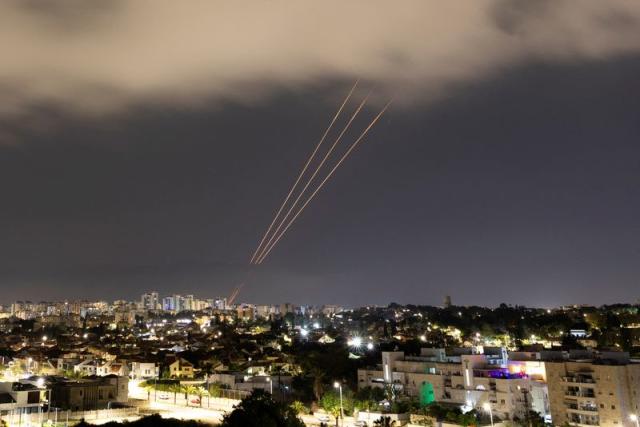Israel vows victory and Iran warns against retaliation after attack
 An anti-missile system operates after Iran launched drones and missiles towards Israel, as seen from Ashkelon, Israel April 14, 2024. REUTERS/Amir Cohen
An anti-missile system operates after Iran launched drones and missiles towards Israel, as seen from Ashkelon, Israel April 14, 2024. REUTERS/Amir CohenBy Dan Williams, Parisa Hafezi and Jeff Mason
JERUSALEM (Reuters) -Iran warned Israel and the United States on Sunday of a “much larger response” if there is any retaliation for its mass drone and missile attack on Israeli territory overnight, as Israel said “the campaign is not over yet”.
The threat of open warfare erupting between the arch Middle East foes and dragging in the United States has put the region on edge as Washington said America did not seek conflict with Iran but would not hesitate to protect its forces and Israel.
Iran launched the attack over a suspected Israeli strike on its consulate in Syria on April 1 that killed top Revolutionary Guards commanders and followed months of clashes between Israel and Iran’s regional allies, triggered by the war in Gaza.
However, the attack from hundreds of missiles and drones, mostly launched from inside Iran, caused only modest damage in Israel as most were shot down with the help of allies including the U.S., Britain and Jordan.
“We intercepted, we repelled, together we shall win,” Israeli Prime Minister Benjamin Netanyahu said on social media.
Israeli Defence Minister Yoav Gallant said despite thwarting the attack, the military campaign was not over and “we must be prepared for every scenario”.
Israel’s Channel 12 TV cited an unnamed Israeli official overnight as saying there would be a “significant response” to the attack as Netanyahu met his war cabinet.
Russia, China, Egypt, the United Arab Emirates and Oman urged restraint.
The Islamic Republic’s mission to the United Nations said the attack had been aimed at punishing “Israeli crimes”, but that it now “deemed the matter concluded”.
Iranian army chief of staff Major General Mohammad Bagheri warned on television that “our response will be much larger than tonight’s military action if Israel retaliates against Iran” and told Washington its bases could also be attacked if it helped Israel retaliate.
U.S. President Joe Biden said he would convene a meeting of leaders of the Group of Seven major economies on Sunday to coordinate a diplomatic response to what he called Iran’s brazen attack.
U.S. Defense Secretary Lloyd Austin said America did not seek conflict with Iran but would not hesitate to act to protect U.S. forces and support the defence of Israel.
The U.N. Security Council was set to meet at 4 p.m. ET (2000 GMT) on Sunday after Israel requested it condemn Iran’s attack and designate the Revolutionary Guards a terrorist organisation.
ESCALATION
On Saturday Iran’s Revolutionary Guards seized an Israel-linked cargo ship in the Strait of Hormuz, one of the world’s most important energy shipping routes, underscoring the risks to the world economy of a wider conflict.
The war in Gaza, which Israel invaded after an attack by Iran-backed Hamas on Oct. 7, has ratcheted up tensions in the region, spreading to fronts with Iran-aligned groups in Lebanon, Syria, Yemen and Iraq.
Iran’s most powerful ally in the region, the Lebanese Shi’ite group Hezbollah – which has been exchanging fire with Israel since the Gaza war began – said early on Sunday it had fired rockets at an Israeli base.
Drones were also reportedly launched against Israel by Yemen’s Iran-aligned Houthi group, which has attacked shipping lanes in and around the Red Sea to show solidarity with Hamas, British maritime security company Ambrey said in a statement.
Iran’s Fars news agency quoted a source as saying Tehran was closely watching Jordan, which might become the next target in case of any moves in support of Israel.
The Oct. 7 attack in which 1,200 Israelis were killed and 253 taken hostage, along with internal discontent with the government and international pressure over the war in Gaza, form the backdrop to Netanyahu’s decisions over a response.
In Jerusalem on Sunday Israelis described their fear during the attack, when sirens wailed and the night sky was shaken by blasts, but differed on how the country should respond.
“I think we’ve been given license to respond now. I mean it was a major attack from Iran… I imagine Israel will respond and may be over quickly and get back to normal life,” said Jeremy Smith, 60.
In Iran, state television showed small gatherings in several cities celebrating the attack, but in private some Iranians were worried about Israel’s response.
“Iran gave Netanyahu a golden opportunity to attack our country. But we, the people of Iran, will bear the brunt of this conflict,” said Shima, a 29-year-old nurse, from Tehran.










